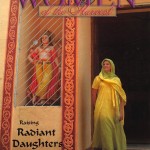It was a Sunday afternoon.
The week before had been heavy with rains,
turning streets into rushing streams.
But this Sunday held promise.
There were four of us,
Three Kenyan women and myself,
sipping cups of Earl Grey tea
at the Karen Country Club.
The fairway broadened into a flourishing green,
framed by Jacaranda trees,
bordered by an English garden,
a large yellow and white umbrella shading us.
All four of us shared common denominators,
our children were gone or going, our grandchildren coming.
We were all educated, professional women,
but most of all we loved God.
Our conversation was warm and expectant,
interspersed with laughter and gentle teasing.
We exchanged more than pleasantries,
we talked about matters of the soul.
One mentioned a Rwandan friend
who had lost everything in the genocide,
but prayed daily for Africa,
prayed that there would never be another Rwanda.
It was sobering.
Suddenly green fairways, lavender Jacarandas,
and the profusion of color of an English garden,
no longer held our interest.
We contemplated what that would mean,
to us, to our families, to our countries.
It would shatter hope, tear down trust,
destroy the soul of a nation.
I sat among my Kenyan friends,
a white woman with tears in her eyes.
They responded.
“But of course, you could be on the next plane out.”
Up to that point, we were neither black nor white.
Just four women drinking tea
on the manicured lawns
of a colonial Country Club in Kenya.
Now I was on the outside looking in.
The white American global worker
who could leave whenever tensions arose.
I was no longer one of them.
As much as I shared as a sister in Christ,
with these precious friends,
I had a different passport, a different citizenship,
I had a way out.
How much should we identify
with those we have learned to love?
Where is my citizenship really?
Where does my loyalty lay?
©2003 Thrive
View the original print magazine where this article was first published.


